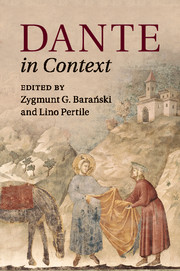Book contents
- Frontmatter
- Dedication
- Contents
- List of illustrations
- List of maps
- Notes on contributors
- Chronology
- Abbreviations and note on translations
- Introduction
- Part I Politics and society
- Part II Intellectual traditions
- 9 Philosophy and theology
- 10 Moral philosophy
- 11 Natural philosophy
- 12 Medicine
- 13 Islamic and Jewish influences
- 14 Cosmology, geography, and cartography
- Part III Linguistic and literary cultures
- Part IV Visual and performative culture
- Part V Dante: life, works, and reception
- Further reading
- Index
13 - Islamic and Jewish influences
from Part II - Intellectual traditions
Published online by Cambridge University Press: 05 October 2015
- Frontmatter
- Dedication
- Contents
- List of illustrations
- List of maps
- Notes on contributors
- Chronology
- Abbreviations and note on translations
- Introduction
- Part I Politics and society
- Part II Intellectual traditions
- 9 Philosophy and theology
- 10 Moral philosophy
- 11 Natural philosophy
- 12 Medicine
- 13 Islamic and Jewish influences
- 14 Cosmology, geography, and cartography
- Part III Linguistic and literary cultures
- Part IV Visual and performative culture
- Part V Dante: life, works, and reception
- Further reading
- Index
Summary
Muslims and Jews loomed large in Dante's Italy between 1250 and 1350. It is possible, indeed, to speak of Jewish and Islamic traditions visibly present in late medieval Italian culture and to which Dante's literary oeuvre offers a significant witness. However, Jewish and Islamic are equivocal terms, as they denote not only two religious traditions, but also their cultural heritage. Any effort to ascertain what these religions meant to Dante's contemporaries must thus reckon both with their limited, mostly distorted theological understanding of Muslim and Jewish religiosity as living traditions of faith, and with their mediated textual access to the cultural archives of Islamic and Jewish intellectual life. This chapter aims at such a dual reconnaissance of Judaism and Islam in the Italo-Christian Middle Ages, with selective recourse to Dante's works as a privileged historical source.
Of course, it is not easy even to establish direct cross-cultural exchanges between Muslims, Christians, and Jews in late medieval Italy. No unequivocal evidence has been found, for example, of specific Muslims or Jews among Dante's known acquaintances, nor other direct contacts that could have inflected his personal views on their faith and culture. However, such personal contacts were more than just a possibility for an Italian Christian in Dante's time. Jews in Italy between the late thirteenth century and the early fourteenth century were concentrated in Sicily and the peninsular south (Apulia, Campania), but there were smaller clusters of Jewish families in Dante's Tuscany (Pisa, Lucca), a larger Jewish community in Rome, and, most relevant, a significant centre of Italo-Jewish intellectual life in Verona at the time of Dante's two visits as a political exile, first at the court of Bartolomeo della Scala (d. 1304) in 1303–04 and later, for a lengthier sojourn from 1312–18 under the patronage of Cangrande della Scala (1291–1329). Dante's putative friendship with the Hebrew poet Immanuel ben Solomon of Rome (‘Manoello Giudeo’, c.1261–c.1335), posited by nineteenth-century scholars, has been mostly discarded in the absence of unimpeachable proof. But Immanuel's genuine admiration for Dante, whom he eulogized in exchanged sonnets with Bosone da Gubbio (between 1260–90 and 1349–77) and whose Commedia he also emulated in his Mahberet ha-tofet ve-ha-eden (The Treatise on Hell and Heaven), gave way to the imagined possibility of such an encounter against the historical backdrop of a contemporary Italo-Jewish Renaissance.
- Type
- Chapter
- Information
- Dante in Context , pp. 200 - 220Publisher: Cambridge University PressPrint publication year: 2015
- 1
- Cited by



